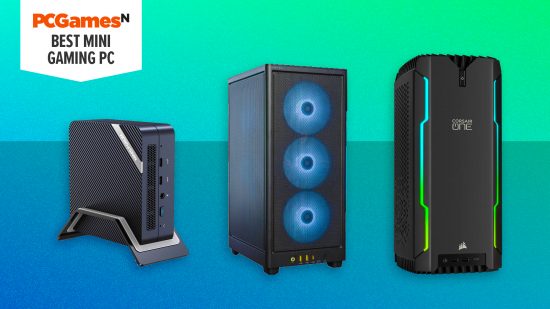What is the best mini gaming PC? The traditional image of a gaming custom PC is some hulking behemoth of a machine, with frantically spinning fans, blazing rainbow RGB LEDs, and monstrously large graphics cards. But the best mini gaming PCs are compact machines that house full-scale components. Despite their size, mini PCs don’t skimp on performance and are ideal for smaller gaming desks or if want to take it traveling.
In this guide, we’ve chosen pre-built mini gaming PCs from the likes of Origin, Corsair, and more. Check out how to build a gaming PC if you want to choose the components and PC case yourself.
Some exceedingly small and cheap mini gaming PCs such as those offered by Minisforum take AMD mobile CPUs, with their iGPUs that punch well above their weight and let them rip with their maximum power draw – which can be capable even at 1080p.
We suggest thinking about cooling solutions and how easy it is to upgrade the machine. There’s no point in spending money on components that are going to throttle the moment they heat up. These are the best mini gaming PCs to game in confidence and small spaces. If you want full power (and have the room), check out our full best gaming PCs guide.
Get gaming gear for less ☞ Our free money-saving tool finds discounts for you at over 40,000 online retailers. Try PCGamesN Deal Finder now.
The best mini gaming PCs today:
- Minisforum UM773 – best for most gamers
- Origin PC Chronos V3 – best premium PC
- Intel NUC 12 Serpent Canyon – true mini PC
- Corsair ONE i400 – stunning design
- Beelink SER6 – best budget option
- Blackview MP200 – best under $450/£350
- Asus Rog Ally – best handheld PC
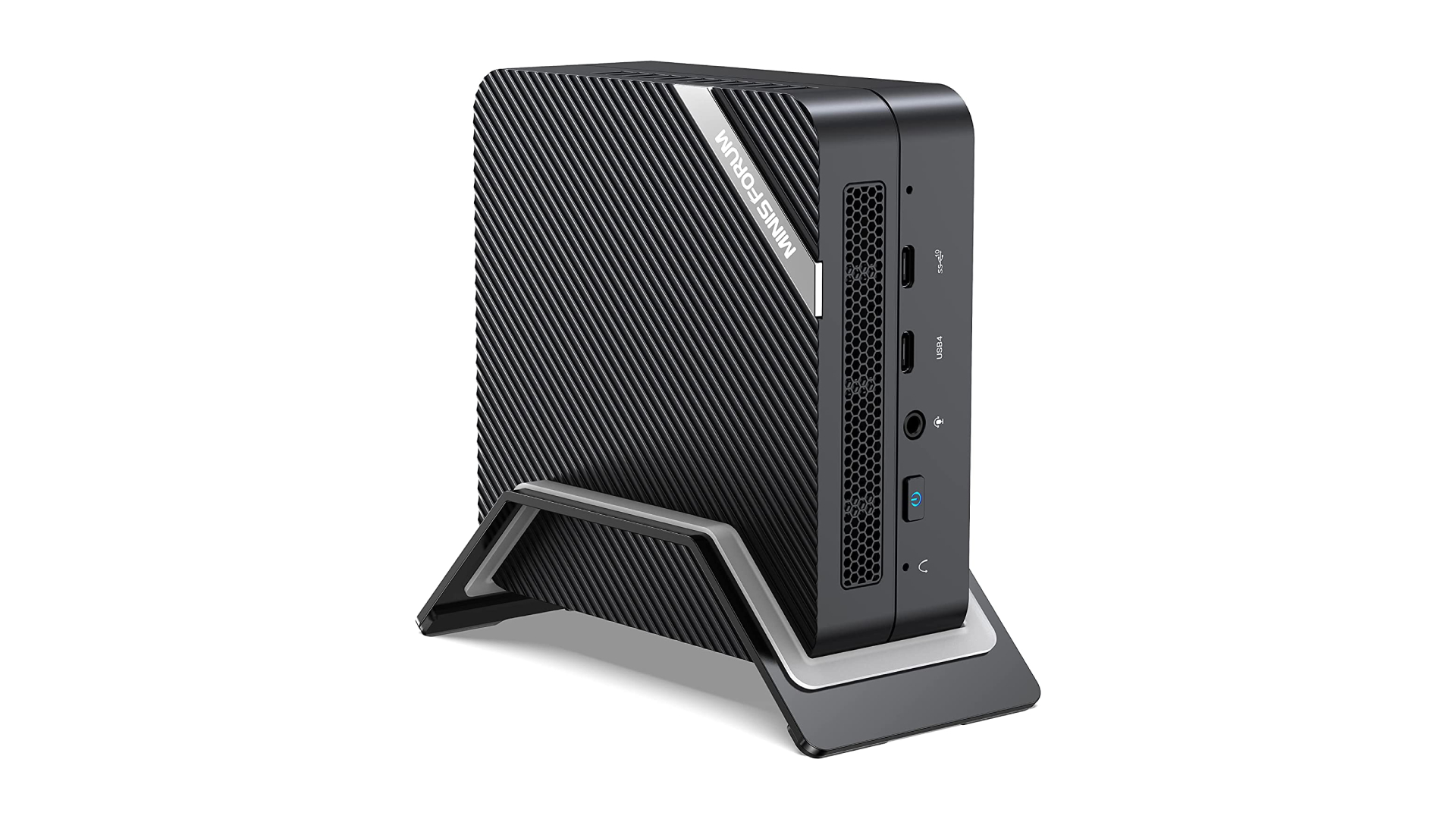
1. Minisforum UM773 Lite
Best mini PC overall for light gaming.
Minisforum Venus UM773 Lite Specs:
| Graphics | AMD RDNA 2 680M |
| CPU | AMD Ryzen 7 7735HS 8 core 3.2GHz – 4.75GHz |
| RAM | 32GB DDR5 |
| Storage | 512GB PCIe 4.0 NVMe SSD |
| Connectivity | RJ45 2.5 Gigabit Ethernet Port, USB3.2 Gen2 Type-C, USB3.2 Gen2 Type-A ×2, USB2.0 Type-A ×2, USB4 Type-C, HDMI ×2, 3.5mm Combo Jack ×1, WiFi 6E, Bluetooth, |
| Cooling | Liquid metal thermal compound, Airway Design 120 fan, two heat pipes |
| Dimensions | 5.03 x 4.9 x 1.8 inches (12.78 x 12.45 x 4.57 cm) |
| Weight | 3.65 lbs (1.66 kg) including power brick |
Pros
- Small yet mighty
- Plenty of RAM
Cons
- Reported defective WiFi cards
“Integrated graphics?” we hear you cry, and we respond with a resounding yes. The $539.99 (£495.20) Minisforum UM773’s AMD 680M sits between the integrated graphics of Valve’s Steam Deck and the Asus ROG Ally which as we all know by now are very capable little machines.
The 680M is allowed to perform at its best because of the inclusion of very fast DDR5 which AMD’s CPUs and iGPUs work nicely with and 32 GB of it no less. Though it is not as capable as its younger sibling the 780M, it manages to be slightly more efficient due to its lower power draw so those working with constrained power budgets will be served here.
Esports titles will run well at 1080p and emulation will be no problem at all. Older titles too will, of course, return great performance so if you’re not too fussed about the latest AAA games, you’re sure to have a great time with this seriously handy little machine, especially when paired with the best gaming monitor to get the most out of this mighty box.
Whilst the Minisforum Venus UM773 doesn’t offer the same portability as the Deck or Ally, it makes up for it in connectivity with a plethora of ports making this a very practical little machine.
It is also surprisingly upgradable with two SODIMM slots, a PCIe 4.0 M.2 slot, and room on the bottom for a 2.5-inch hard drive. You could also connect an eGPU via the USB4 port if you wanted some extra GPU down the line as the CPU will age more gracefully than the iGPU.
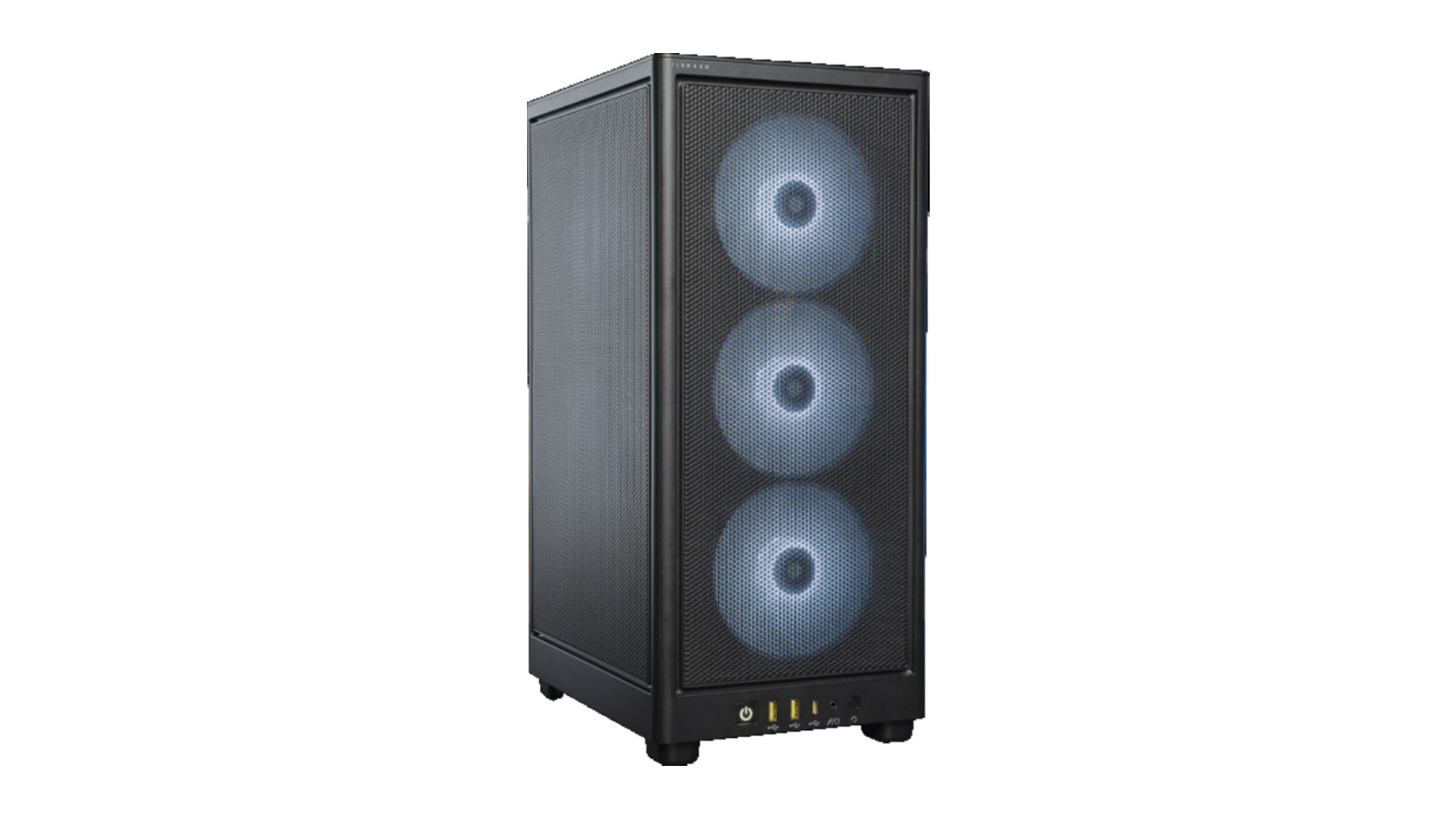
2. Origin PC Chronos V3
Best premium mini gaming PC.
Origin Chronos V3 specs:
| Graphics | Nvidia RTX 4070 Ti 12GB |
| CPU | AMD Ryzen 7 7800X3D |
| RAM | 32GB Corsair Vengeance DDR5 5600Mhz |
| Motherboard | ASUS ROG Strix X670E-I WiFi |
| PSU | 850 Watt CORSAIR SFX-L Series |
| Storage | 1TB Samsung PM9A1 M.2 NVMe PCIe Gen 4.0 |
| Connectivity | 2 x USB-C 4.0, 1 x USB-C 3.1, 5 x USB-A 3.2, 3 x USB-A 2.0, 5 x USB-A 3.2, 3.5mm headphone/mic |
| Cooling | 2 x 120mm fan, 80mm fan, iCUE H100i ELITE CAPELLIX XT Liquid CPU Cooler |
| Dimensions (W x H x D) | 7.87 x 17.71 x 10.6 (20cm x 45cm x 27cm) |
Pros
- Powerful all-rounder
- Easily upgradeable
- PCIe Gen 5.0
Cons
- Not the smallest
- Expensive
Well-established custom PC builders Origin have updated their CHRONOS line to use parent company Corsair’s svelte 2000D case whose vertical design makes us think that it’s some supercharged Xbox Series X with its cuboid design.
At $2,806 it isn’t the cheapest, but Origin PC has been in the business a long time for good reason so you can be sure you will be getting a quality product that won’t be giving you any headaches.
With an AMD Ryzen 7 7800 X3D and Nvidia RTX 4070 Ti, you can be sure to be playing the latest AAA games for a while, especially with more games supporting DLSS 3 frame generation introduced with the RTX 4000 series.
Being owned by Corsair, you can quite often get good deals on peripherals if you need a new monitor, keyboard, mouse, and streaming goodies. Be sure to check out our best gaming headsets if you need a sonic solution for your ears.
It’s on the cusp of being a mini PC however as it is quite large still, but is certainly smaller than your average ATX case. You can go smaller with other options but given Origin’s credentials, customer service, and flexibility, we’ve included it as our best overall pick.
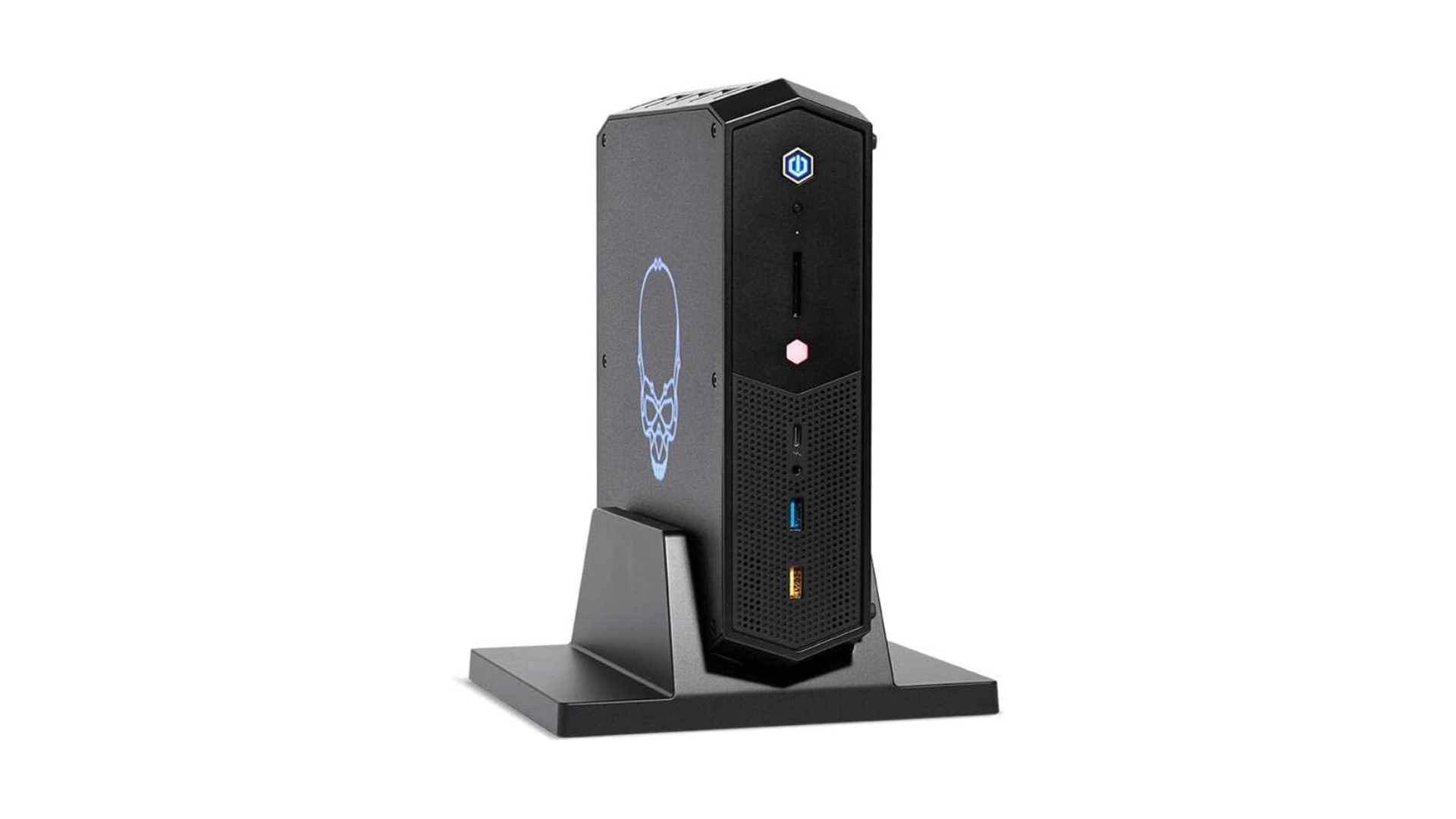
3. Intel NUC 12 Serpent Canyon
Best true mini PC with dedicated graphics.
Intel NUC 12 Serpent Canyon Specs:
| Graphics | Intel Arc A770M 16GB |
| CPU | Intel i7-12700H |
| RAM | 16GB DDR4 3200Mhz |
| Storage | 1TB PCIe 4.0 NVMe SSD |
| Connectivity | HDMI 2.1 (4K60), DisplayPort 2.0 x 2, Thunderbolt/USB4 Type-C ports x 2, USB3.2 Gen2 Type-A ×6, 3.5mm Combo Jack ×1, 2.5Gb ethernet, Consumer infrared port, WiFi 6E, Bluetooth 5.2 |
| Cooling | Two fans and heat pipes |
| Dimensions | 9.06 x 7.09 x 2.36 inches (23 x 18 x 6 cm) |
| Weight | 4.34 lbs (1.97 kg) |
Pros
- Pint-sized gaming PC
- Slick console-like design
- Powerful dedicated graphics
Cons
- Intel Arc teething issues
- Expensive
Intel’s NUC (Next Unit of Computing) series has been around for a few years now but for the first time, they’ve updated their designs with their own Arc series of GPUs for a true-blue all-Intel system.
This is all packaged in an exceedingly handsome and small case that puts the PS5 and Xbox Series X to shame when it comes to a performance-to-size ratio as the NUC 12 Serpent Canyon is so small that we’re surprised there’s even a GPU in there. It has an air of “This is what the Xbox 720 will look like” about it which we’re quite fond of too.
The Serpent Canyon has an Intel Arc A770M with 16GB of GDDR6 VRAM so you shouldn’t run into any limitations with the recent spate of resource-heavy AAA games. The Arc cards have excellent ray-tracing performance for their price point, eclipsing AMD in this regard.
Also included is a very capable i7-12700H so CPU workloads will be breezy and will keep up with the performant A770M.
Whilst the CPU and GPU aren’t upgradable, there are plenty of drive options with 2 M.2 PCIe 4.0 slots and an M.2 PCIe slot. The RAM is also user-replaceable.
Something to consider is how the Intel Arc cards have fared since release. They are leaps and bounds better than were with DX9, 10, and 11 performance seeing massive improvements but Nvidia and AMD have better legacy support for older titles. Intel’s upscaling technology XeSS isn’t as widely supported but it is being increasingly integrated by developers.
Recent AAA titles that have VRAM issues have influenced our decision to include the Serpent Canyon as the 16GB of VRAM and good DX12 performance see the NUC punching above its weight here. This is at a high cost, but we think it’s worth it given the unique design and improved performance.
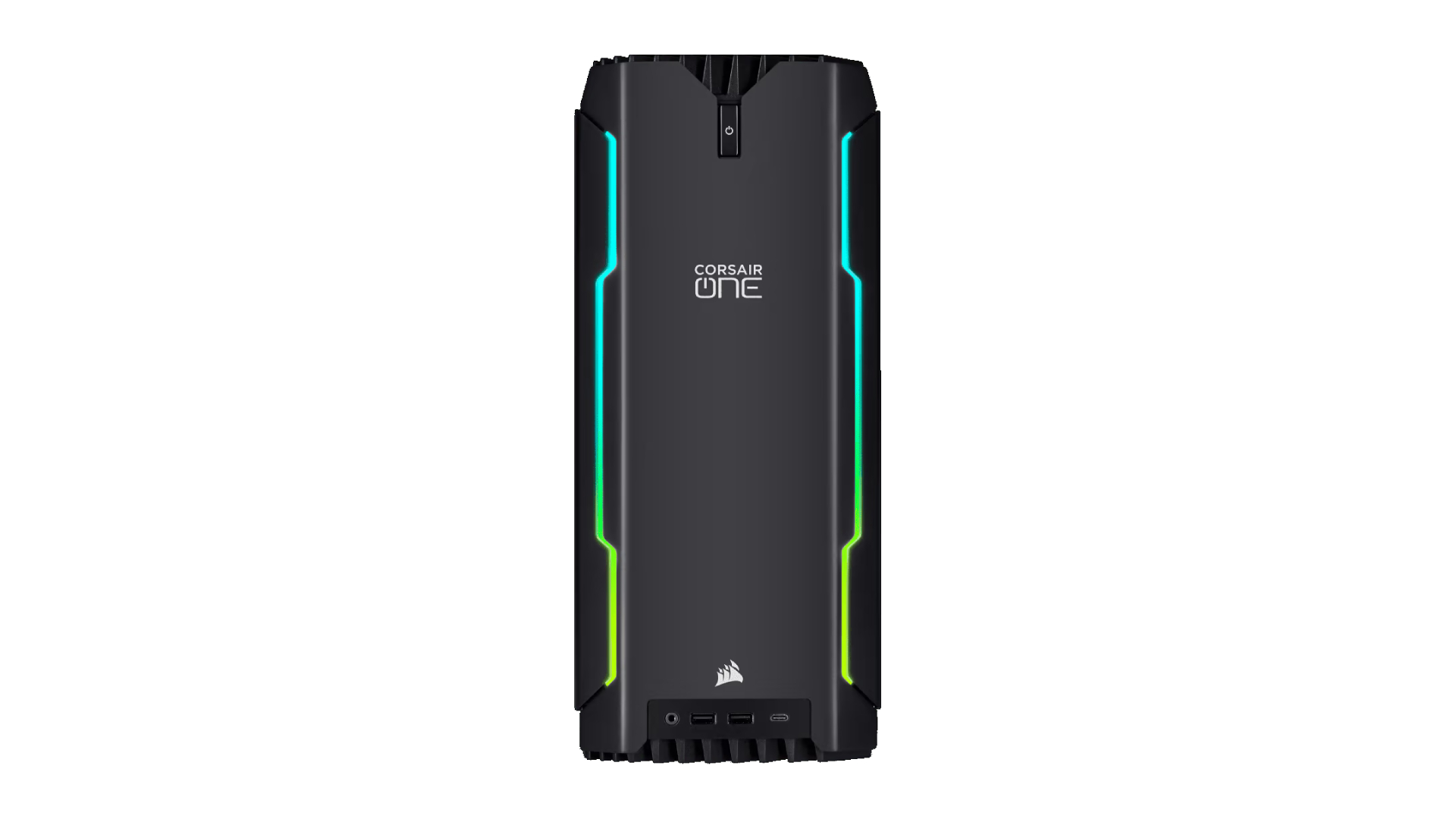
4. Corsair ONE i400
The mini gaming PC with the best design.
Corsair ONE i400 Specs:
| Graphics | Nvidia RTX 3080 10 GB |
| CPU | Intel i7-13700KF |
| RAM | 32GB (2 x 16GB) DDR5-5600MHz |
| Storage | 1TB NVMe SSD |
| PSU | 750W SFX 80 PLUS Platinum |
| Connectivity | USB 3.1 Gen 1 x 2, USB 3.2 Gen 2 Type-C, Thunderbolt 4 x 2, USB 3.2 Gen 2 Type-A, USB 3.2 Gen 1, 7.1 Audio, 2.5G Ethernet, Wi-Fi 6E, Bluetooth 5.2 |
| Cooling | 2 liquid AIO coolers |
| Dimensions | 6.93 x 7.87 x 14.96 inches (17.6 x 20 x 38 cm) |
| Weight | 9.6 lbs (4.35 kg) |
Pros:
- Striking design
- Excellent performance
Cons:
- Expensive for RTX 3080 PC
- Difficult to upgrade
Look at that subtle RGB lighting. The tasteful thickness of it Oh my god, it even has water cooling. It’s the Corsair ONE i400 with Intel’s latest 13th gen i7-13700KF and clearly, they are still pretty proud of themselves as they have stuck with the tried and true Corsair One case, and really, who could blame them?
It’s become something of a PC design icon since the original Corsair One debuted back in 2017, and we’ve been fans of it ever since – its predecessor was in our best gaming PC list.
The ONE i400 also has faster DDR5 RAM to help raise those 1% lows whilst gaming and chewing through the embarrassing amount of tabs we have open. The RTX 3080 is still a formidable card and most of the time you should have a great experience playing games or using GPU-accelerated programs.
It is a bit disappointing to see only the RAM and CPU see a refresh. At the asking price of $2,499.99, we think an RTX 4070 Ti would be the obvious pairing as the extra VRAM would help ease any concerns about how memory-hungry new AAA games have been as of late. The Corsair ONE i400 is also a little more awkward to work in than even some smaller PCs due to its unique design, but we think the tradeoff here is worth it if you feel confident pulling it apart and back together again.
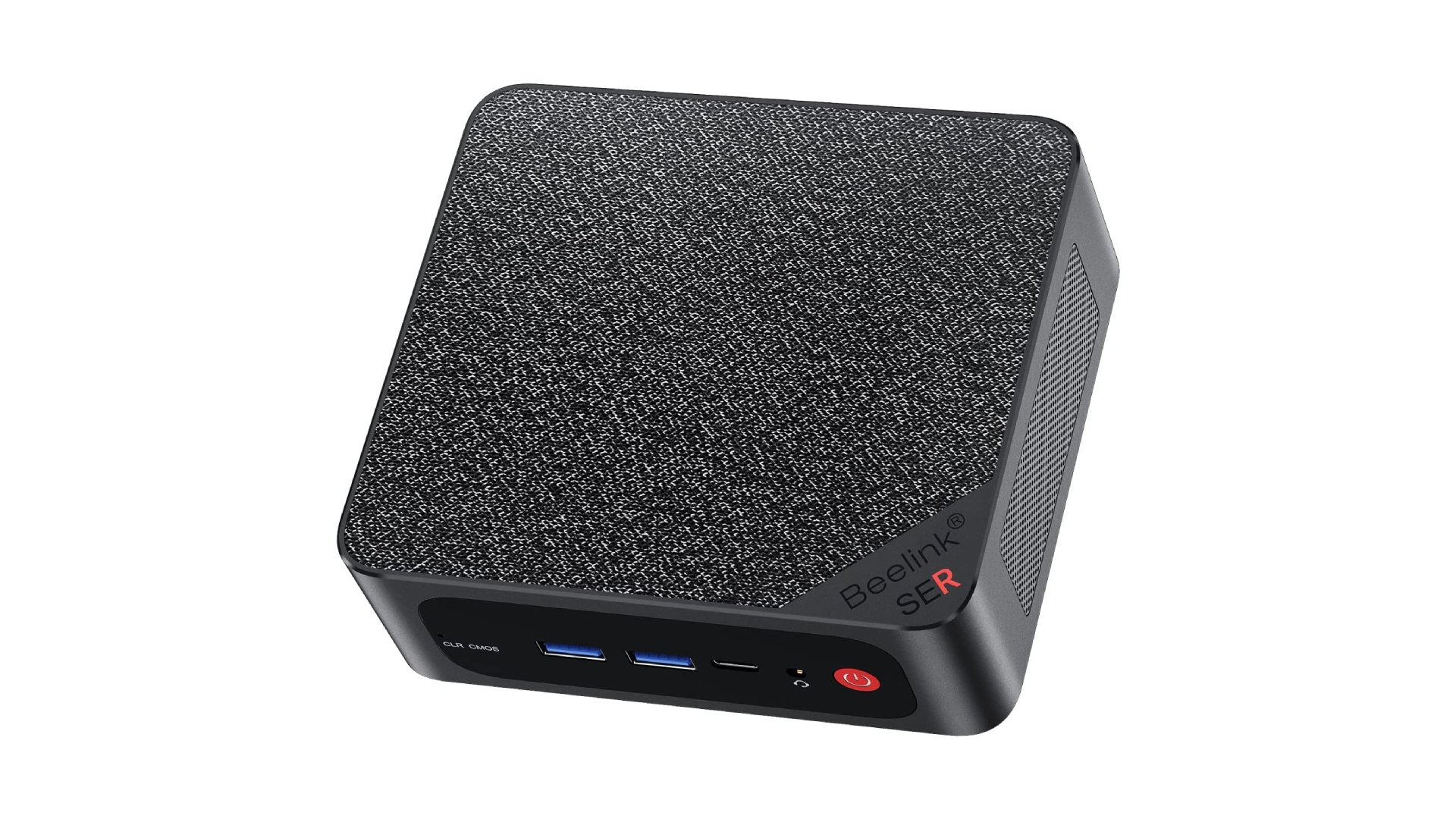
5. Beelink SER6 Gaming Mini PC
Best budget mini gaming PC.
Beelink SER6 Specs:
| Graphics | AMD RDNA 2 660M |
| CPU | AMD Ryzen 5 6600H 6 core 4.5Ghz |
| RAM | 16GB DDR5 4800MHz dual channel |
| Storage | 512GB PCIe 4.0 NVMe SSD |
| Connectivity | USB 3.2 Gen 2 x 3, USB 2.0, HDMI x 2, 2.5Gb ethernet, Wi-Fi 6, Bluetooth 5.2 |
| Cooling | Two fans |
| Dimensions | 4.96 x 4.45 x 1.65 inches (12.6 x 11.3 x 4.2 cm) |
| Weight | 1.13 lbs ( 0.51 kg) |
Pros
- Steam Deck level of performance
- Upgradable RAM and storage
Cons
- Loud and high-pitched fan noise
- Only a little cheaper than 680M systems
AMD’s integrated graphics make another showing here with the Beelink SER6. The SER6 has an AMD 660M that is slightly less powerful than the iGPU of the Steam Deck, but the SER6 has two extra CPU cores and more power available to it so you can expect your games and general computing to feel a little snappier. To keep the Ryzen 5 6600U running sweet there is 16GB of DDR5 RAM and older and lighter titles such as Minecraft and League of Legends will hum along nicely.
You also have good options for expanding your storage and RAM with user two SODIMM slots and a PCIe 4.0 M.2 slot which are user-replaceable. Similarly to the Minisforum, there is space for a 2.5” drive at the bottom of the SER6 if you want to get silly with the storage and dump all your (legally owned) ROMs for a great little emulation machine. If the included 512GB isn’t enough, be sure to check out our best SSD for gaming roundup.
An unfortunate flaw here though is the dual fan design. Because the individual fans are smaller, they are much higher pitched than a larger singular fan would be so when things heat up, it can be a little loud. It’s also only a little cheaper at $429 (£539) than a 680 M-equipped mini PC so you may want to spend an extra bit of cash for the additional CPU and CU cores.
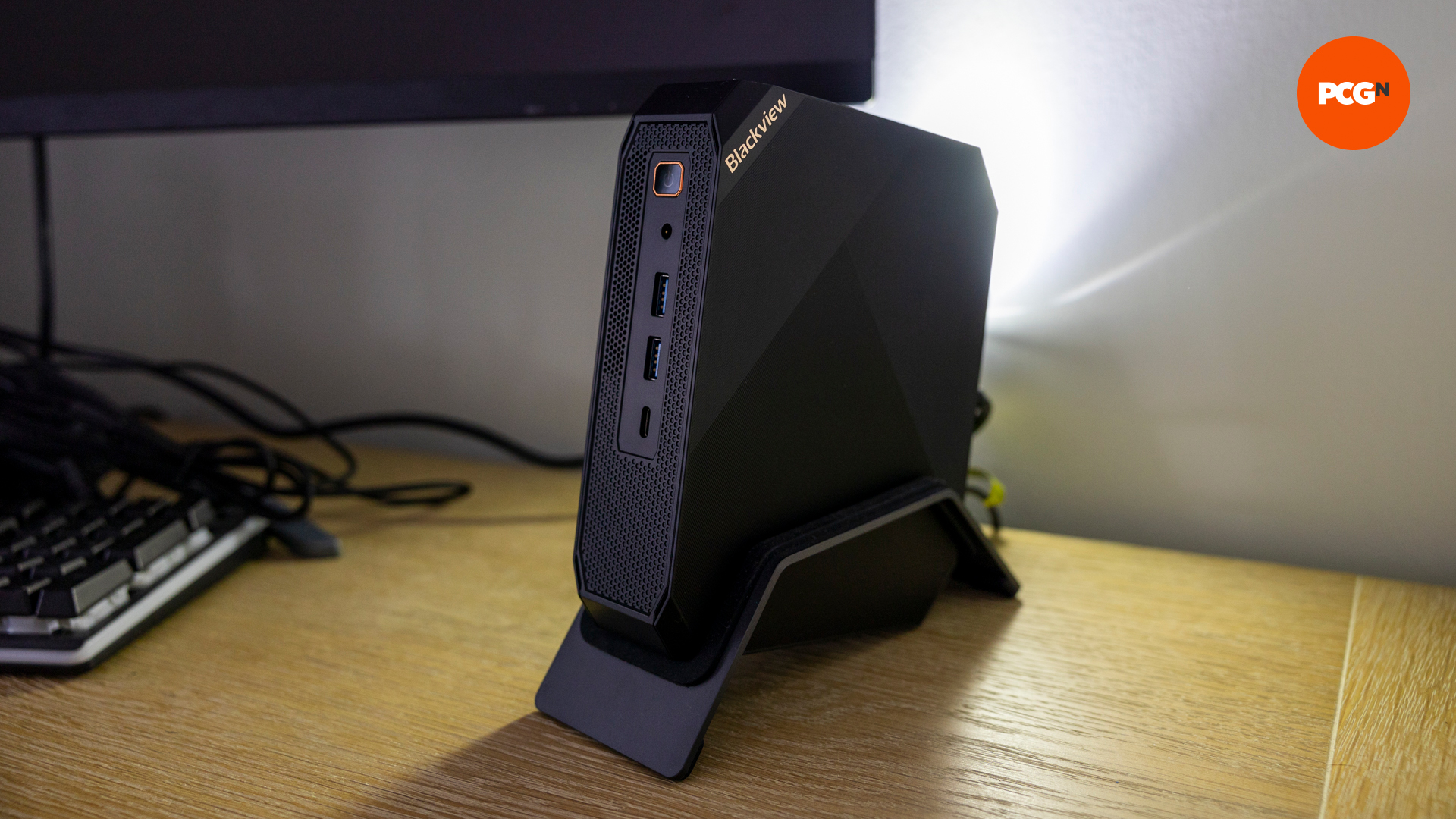
6. Blackview MP200
Best mini PC under $300/£300
Blackview MP200 specs:
| Graphics | Intel Ultra-HD Graphics |
| CPU | Intel Core i5-11400H |
| RAM | 16GB DDR4 3200MHz |
| Storage | 512GB M.2 |
| Connectivity | USB 3.2 Gen 2 x 4, HDMI 2, USB type C, 3.5mm Headphone Jack, Wifi 6, 1000Mbs LAN |
| Dimensions | 183.2 x 150 x 75.5mm |
| Weight | 1.52lbs (690g) |
Pros
- One of the cheapest mini PCs
- Good for daily tasks
Cons
- Noisy fans during medium loads
- No dedicated graphics card
The Blackview MP200 is the ideal mini PC for those who want to spend as little as possible. Its competitive pricing makes it our top cheap option, but that price does mean limitations with performance.
Inside the MP200, the Intel Ultra-HD Graphics hinder gameplay somewhat, to the extent that you’ll need to play most in the lowest settings. It’s not impossible to play the best PC games, but you may struggle with triple AAA releases.
There are enough ports to add three displays with USB 3.2 connectivity, and the storage and RAM can both be doubled if you want to add second modules and upgrade the machine further down the line. We’d recommend the Blackview MP200 if you want one of the cheapest Windows 11 PCs on the market, but if gaming is your priority then lack of graphics card and cooling will let you down.
Read our Blackview MP200 review.
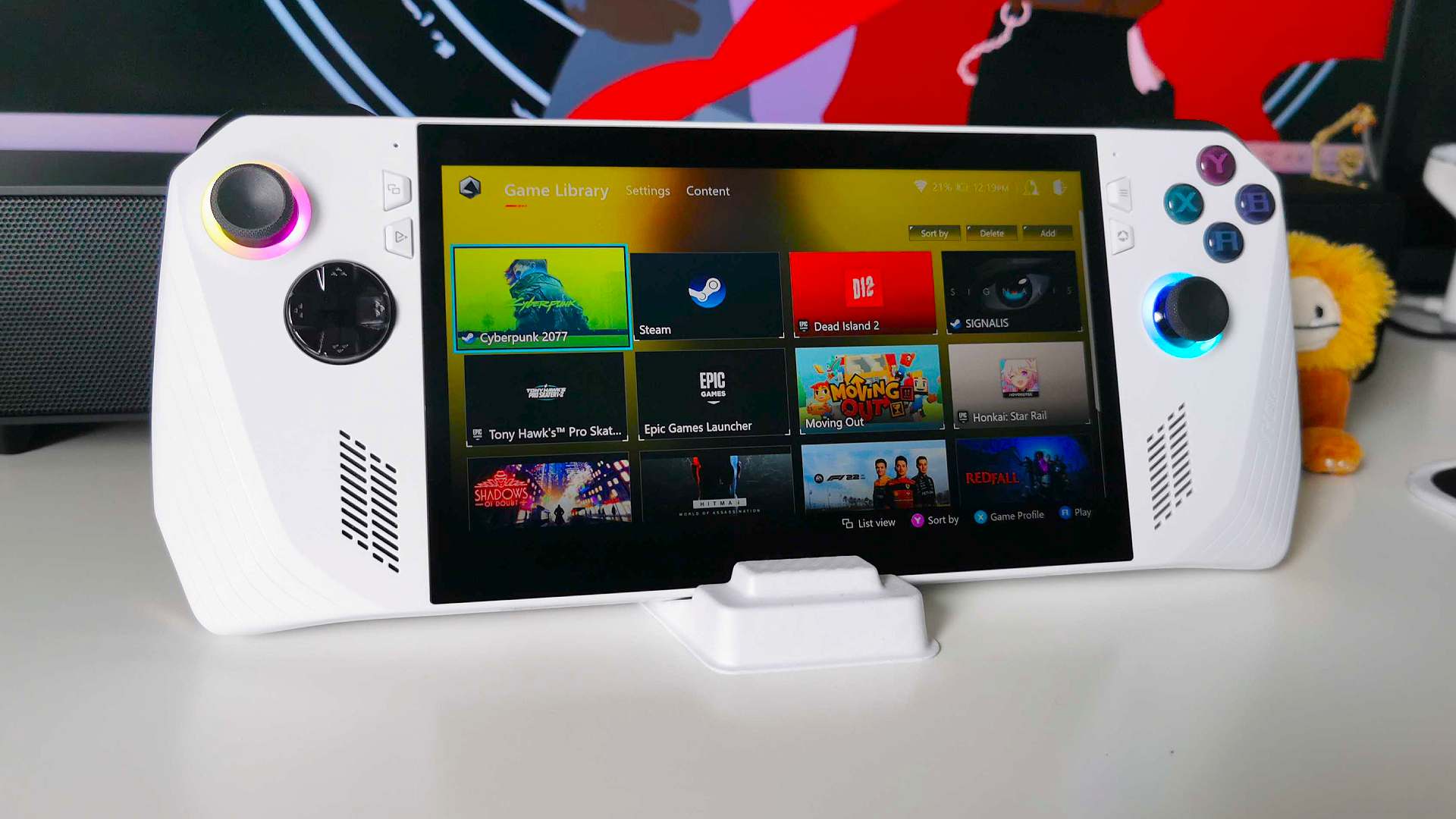
7. Asus ROG Ally
Best portable mini gaming PC.
Asus ROG Ally specs:
| Graphics | AMD 780M |
| CPU | AMD Z1 Extreme APU 8 core |
| RAM | 16GB LPDDR5 6400Mhz Dual channel |
| Display | 7 inch IPS 1080p 120Hz (VRR) |
| Storage | 512GB PCIe 4.0 NVMe SSD, microSD |
| Connectivity | ROG XG Mobile Interface, USB 3.2 Gen 2 Type-C |
| Cooling | Dual fan design |
| Dimensions | 11.02 x 4.37 x 0.83 ~ 1.28 inches (28.0 x 11.1 x 2.12 ~ 3.24 cm) |
| Weight | 1.34 lbs (0.61 kg) |
Pros
- Inexpensive
- Very powerful
- Highly portable
Cons
- Armory Crate software needs improving
- Windows 11 isn’t the best portable OS
The Asus ROG Ally may have a display and a built-in controller but it is by all accounts, a mini gaming PC that just so happens to be extremely portable. We were mightily impressed by the $699 (£699) Ally in our review.
It’s eeked out the Steam Deck for the best portable mini gaming PC because of its extra grunt in the GPU and CPU department which lets us play games on the go at 1080P.
When plugged in at home, you can opt for the maximum power envelope that would normally rinse your battery and have a very capable little computer that you can do pretty much anything on. With the XMG connector, you can plug in one of Asus’ external GPUs without losing any performance to the limitations of USB 4 as you have full access to the PCIe lanes.
You’ll need a good gaming keyboard and gaming mouse setup to make full use of the desktop environment though, editing the Excel spreadsheet might be a little difficult with the joysticks.
Any hiccups in performance will be smoothed out by the VRR screen too so unless you have some very heavy 1% and 0.1% lows, you shouldn’t notice any dips in frame rate allowing for a smooth and consistent experience.
Unfortunately, Asus’ Armory Crate overlay paired with Windows 11 doesn’t shine a candle to Valve’s SteamOS in terms of functionality, but this will no doubt improve with time and you have the added benefit of knowing that games such as Fortnite and Roblox will work out of the box.
Read our ASUS Rog Ally review.
Are mini PCs good for gaming?
A mini PC can be a good option for gaming, but it all depends on how much performance you need – and how much you’re willing to spend. The most expensive mini PCs like the Corsair i400 are equipped with high-end CPUs and dedicated GPUs, while there are some limitations to truly mini PCs.
With less space for cooling systems, this can lead to higher temperatures and loud fan noise during intensive gaming sessions – something we found to be true with the Blackview MP200. The compact form factor may also limit upgradability compared to larger desktop counterparts, as you might get fewer expansion slots. As mini PC technology has improved, high-performance mini gaming PCs can now mostly meet the demands of modern gamers.
